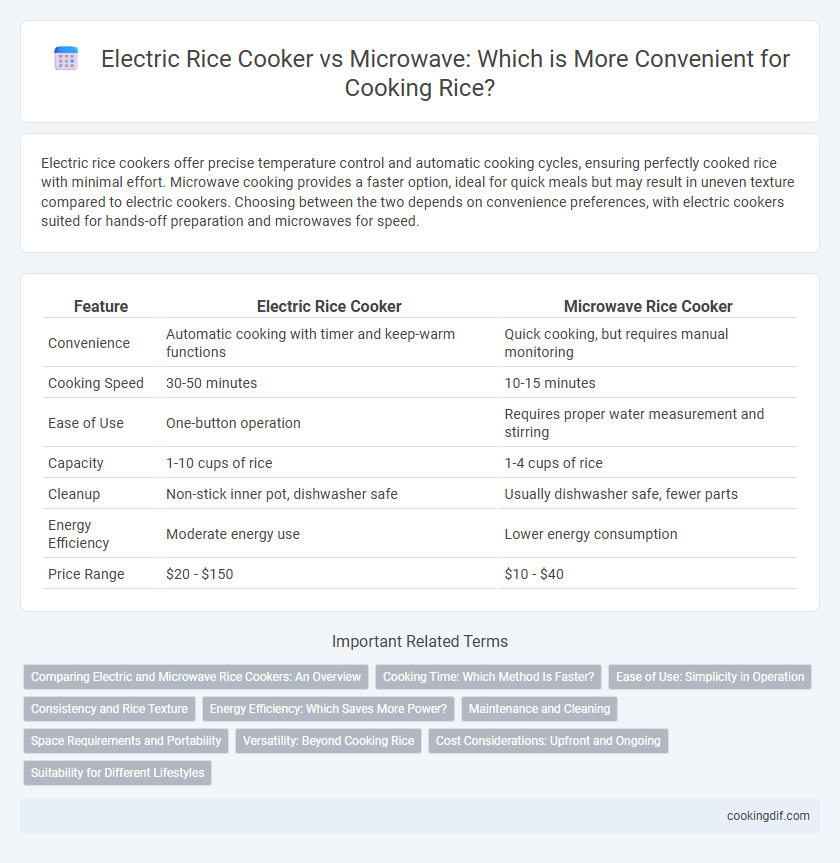Electric rice cookers offer precise temperature control and automatic cooking cycles, ensuring perfectly cooked rice with minimal effort. Microwave cooking provides a faster option, ideal for quick meals but may result in uneven texture compared to electric cookers. Choosing between the two depends on convenience preferences, with electric cookers suited for hands-off preparation and microwaves for speed.
Table of Comparison
| Feature | Electric Rice Cooker | Microwave Rice Cooker |
|---|---|---|
| Convenience | Automatic cooking with timer and keep-warm functions | Quick cooking, but requires manual monitoring |
| Cooking Speed | 30-50 minutes | 10-15 minutes |
| Ease of Use | One-button operation | Requires proper water measurement and stirring |
| Capacity | 1-10 cups of rice | 1-4 cups of rice |
| Cleanup | Non-stick inner pot, dishwasher safe | Usually dishwasher safe, fewer parts |
| Energy Efficiency | Moderate energy use | Lower energy consumption |
| Price Range | $20 - $150 | $10 - $40 |
Comparing Electric and Microwave Rice Cookers: An Overview
Electric rice cookers provide precise temperature control and adjust cooking time automatically, resulting in consistently fluffy rice with minimal effort. Microwave rice cookers offer faster cooking times and are ideal for small portions or quick meals, but may require closer monitoring to avoid uneven cooking. Choosing between the two depends on balancing convenience, cooking speed, and desired rice texture.
Cooking Time: Which Method Is Faster?
Microwave rice cooking typically takes around 10-15 minutes, making it one of the fastest methods compared to electric rice cookers, which usually require 20-30 minutes. Electric rice cookers offer a hands-free experience with automatic settings but generally involve longer overall cooking and warming times. For speed and simplicity, microwaving rice provides a quicker solution, especially for single servings or small portions.
Ease of Use: Simplicity in Operation
Electric rice cookers offer a user-friendly experience with one-touch controls and automatic cooking functions, ensuring consistent results without constant monitoring. Microwave rice cooking requires manual timing and occasional stirring, which can be less intuitive and may lead to uneven cooking. The simplicity and automation of electric rice cookers make them more convenient for users seeking effortless rice preparation.
Consistency and Rice Texture
Electric rice cookers provide consistent results by evenly distributing heat and maintaining optimal moisture levels throughout the cooking process, ensuring fluffy, well-cooked rice with minimal user intervention. Microwave cooking can lead to uneven texture due to inconsistent heating, often resulting in partially undercooked or overly dry grains. For reliable texture and uniformity, electric rice cookers outperform microwaves in maintaining ideal rice moisture and softness.
Energy Efficiency: Which Saves More Power?
Electric rice cookers use precise temperature control and insulation to minimize energy consumption, often operating at around 300-500 watts during cooking. Microwave rice cooking typically requires shorter cook times but uses higher power levels, approximately 600-1200 watts, resulting in less energy-efficient heating. Considering energy efficiency, electric rice cookers generally save more power by maintaining consistent low energy use throughout the cooking cycle compared to microwaves.
Maintenance and Cleaning
Electric rice cookers offer easy maintenance with removable non-stick inner pots that simplify cleaning and reduce residue buildup, ensuring hygienic use. Microwave rice cooking typically requires more frequent scrubbing of containers due to uneven heating and potential overflow, increasing cleaning effort. Choosing electric rice cookers minimizes cleanup time and enhances convenience for daily rice preparation.
Space Requirements and Portability
Electric rice cookers typically require a dedicated countertop space and access to an electrical outlet, making them less portable but convenient for frequent use in a fixed kitchen area. Microwave rice cooking offers greater portability and minimal space requirements, as it only needs a microwave-safe container and does not rely on bulky appliances. The compactness and ease of use of microwave methods are ideal for small kitchens, dorm rooms, or travel situations where space and mobility are critical.
Versatility: Beyond Cooking Rice
Electric rice cookers offer programmable settings that allow steaming vegetables, cooking soups, and even baking cakes, enhancing kitchen versatility beyond just rice preparation. Microwave cooking provides rapid heating but lacks specialized functions, limiting its use primarily to simple reheating or quick cooking tasks. Choosing an electric rice cooker can significantly expand culinary options and streamline meal preparation in modern kitchens.
Cost Considerations: Upfront and Ongoing
Electric rice cookers typically involve a higher upfront cost, often ranging from $30 to $150 depending on features and capacity, while microwave cooking requires minimal investment, usually just the cost of a microwave-safe container. Ongoing electricity expenses for electric rice cookers are generally lower due to efficient energy use and consistent cooking times, whereas microwave rice cooking can result in slightly higher electricity consumption per session due to varying power levels and shorter bursts. The choice between electric and microwave rice cooking hinges on balancing initial investment against long-term energy efficiency and convenience preferences.
Suitability for Different Lifestyles
Electric rice cookers offer precise temperature control and programmable features, making them ideal for busy professionals and families who prioritize consistency and meal prep efficiency. Microwave rice cooking provides a quick solution suited for students or individuals with limited kitchen space, allowing rapid meal preparation with minimal cleanup. Both methods cater to different lifestyle needs, with electric cookers favoring scheduled cooking routines and microwaves accommodating spontaneous, time-sensitive meals.
Electric vs microwave rice cooking for convenience Infographic

 cookingdif.com
cookingdif.com